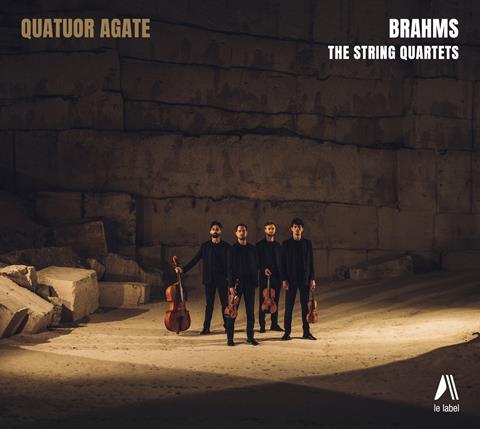BRAHMS The String Quartets (Quatuor Agate)
View record and artist detailsRecord and Artist Details
Genre:
Chamber
Label: Appasionato
Magazine Review Date: 04/2024
Media Format: CD or Download
Media Runtime: 110
Mastering:
DDD
Catalogue Number: APP003

Tracks:
| Composition | Artist Credit |
|---|---|
| String Quartet No. 1 |
Johannes Brahms, Composer
Quatuor Agate |
| String Quartet No. 2 |
Johannes Brahms, Composer
Quatuor Agate |
| String Quartet No. 3 |
Johannes Brahms, Composer
Quatuor Agate |
| (6) Pieces, Movement: No. 5, Romance in F |
Johannes Brahms, Composer
Quatuor Agate |
Author: Stephen Cera
The namesake of France’s Quatuor Agate is an ornamental gemstone. ‘Agate’ also alludes to the group’s affinity for Brahms, whose second muse (after Clara Schumann) was the soprano Agathe von Siebold. Brahms is the calling card in this impressive recording debut by the young quartet, whose playing reflects not only its roots in the French school but the four musicians’ years of study in Berlin. Their smooth tone, keen ensemble and secure intonation bring ample rewards in the three challenging works. I like the ardent but never indulgent emotionalism, and a collective sound that avoids heaviness or an impasto of thick vibrato. They strive to capture the distinctive ‘voice’ of each of these compositions.
In Op 51 No 1, they fearlessly address the most Beethovenian of the three quartets, a cousin of Brahms’s First Symphony in the same key of C minor. The players excel not only in managing their individual instruments but also in the management of the overall quartet texture – no easy feat in this repertoire. They make lines and chords balance so that the logic of the music’s progression isn’t obscured. This entails carefully planning the swell and decay of individual notes while being ever attentive to the total sound. Above all, the Quatuor Agate present the image of four musicians speaking with a single voice.
That voice sings with sweeter lyricism in Op 51 No 2, a less rugged work than its companion. Note the way the two violins match their sound in the first movement’s second subject (from 5'05"). Phrases ‘breathe’ and don’t sound unnaturally pushed, even in the spit-and-polish precision of the Allegretto vivace section of the Minuetto (from 1'44") or the bracing unity at the start of the finale.
Quatuor Agate offer a mature performance of the B flat Quartet, Op 67, the most Classical and ‘Haydnesque’ of the three quartets. After its opening horn-call theme, this is a work full of complex and ingenious details that benefit from the group’s clarity and security. Brahms plays around a lot with metre and toys with rhythms, and the Agate make it all clear.
In the third movement the lead is given to Raphaël Pagnon’s songful viola, so prominent in this work, while the other instruments (all three muted) primarily accompany. The finale is a Brahmsian tour de force, a masterly set of variations on an unprepossessing little theme. Note the sensitivity with which the Agate handle the pacing of each variation and the pauses between them. This final movement represents a high point in Brahms’s deployment of variation form, ending with a gesture worthy of Haydn: that opening horn-call theme turns out to fit, with only slight adjustments, into the pattern of the variations theme. It was there all along, but we didn’t see it coming.
As a bonus, the new album includes first violinist Adrien Jurkovic’s quartet arrangement of Brahms’s late Romanze in F for piano, Op 118 No 5.
Discover the world's largest classical music catalogue with Presto Music.

Gramophone Digital Club
- Digital Edition
- Digital Archive
- Reviews Database
- Full website access
From £8.75 / month
Subscribe
Gramophone Full Club
- Print Edition
- Digital Edition
- Digital Archive
- Reviews Database
- Full website access
From £11.00 / month
Subscribe
If you are a library, university or other organisation that would be interested in an institutional subscription to Gramophone please click here for further information.




